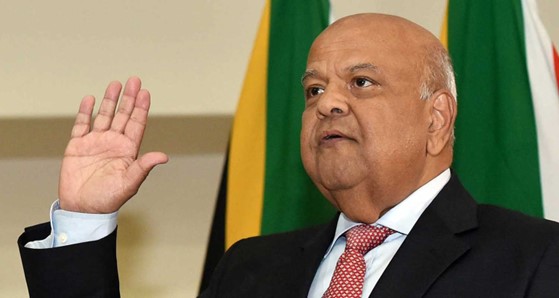Long time politician and former anti-apartheid activist Pravin Gordhan has died after a complex battle with cancer that saw an end to his career in public service to South Africa. His age was 75. Gordhan who held three different positions in the nation’s cabinet, won plaudits and rousing approval for standing up to then President Jacob Zuma during his scandal-marred presidency, had died his family said in an e-mailed statement. The former statesman passed away in the early part of Friday last week.
Gordhan died in hospital in the early hours of Friday morning after battling cancer, his family said in an e-mailed statement. A veteran anti-apartheid activist and high-ranking member of the ANC, Gordhan made a name for himself within government by leading an overhaul of the national tax agency years before serving under Zuma. Zuma repeatedly undermined Gordhan’s authority, describing Van Rooyen as the most qualified finance minister. Recruited to the post in 1999 by then-finance minister Trevor Manuel, Gordhan served as commissioner of the South African Revenue Service for a decade and transformed it into a world-class organisation, overhauling its systems and recruiting a new team of highly skilled personnel. Government revenue more than tripled during his tenure as an additional 1.5 million people were drawn into the tax net.
Zuma had become accustomed to concentrating power in his hands and that included manipulating state finances to his advantage. Gordhan was an obstacle in that regard. Zuma wanted someone he could control at the expense of the country’s interests. This is why he originally appointed David Van Rooyen, a first time and little-known member of parliament to the portfolio. This happened after the dismissal of Nhlanhla Nene from the position despite his long-time experience. What followed thereafter was the South African Gross Domestic Profit (GDP) being plunged into junk status by international markets. The banking sector was up in arms. Zuma had to reshuffle his cabinet again this time to shift Gordhan from the Department of Cooperative Governance and Traditional affairs back to Finance and Van Rooyen was given Gordhan’s former post at the time.
Gordhan an experienced and fiscal reform minded former Treasury official was not playing ball with Zuma’s power play. This led to their falling out.
After winning a second term in 2014, Zuma assigned the finance portfolio to Nhlanhla Nene and named Gordhan as cooperative governance and traditional affairs minister. Linked to a succession of scandals, Zuma in 2015 fired Nene and replaced him with a little-known lawmaker, David van Rooyen. The move triggered a selloff in the rand and the nation’s bonds, and business and ruling-party leaders pressured Zuma to reconsider. Four days later, he announced that Gordhan and Van Rooyen would swap portfolios. But Zuma repeatedly undermined Gordhan’s authority, describing Van Rooyen as the most qualified finance minister he’d ever appointed and rebuffing Gordhan’s request to fire tax chief Tom Moyane for insubordination. Gordhan defied Zuma’s attempts to open the spending taps and finance a nuclear expansion programme, presenting a national budget that proposed spending curbs and higher taxes.
Zuma at the time clearly did not have the best interests of the South African nation at heart. He was playing a high-risk game of musical chairs with cabinet portfolios. This nearly ruined the economy and led to record high levels of unemployment. Had it not been for Gordhan’s reappointment to head the state treasury Department once again there is no telling how bad things would have become. The official reason for Nene’s dismissal, was so that he could assume the presidency of the BRICS Development Bank. This never happened. Instead, former Brazilian President Dilma Rousseff was appointed at the helm. What is more there was never any official confirmation for Nene. Gordhan on the hand tried to lead the Department of Finance with a moral compass. Not giving in to the excesses of Zuma and his friends the Gupta brothers.
As a result, he became increasingly isolated and was eventually axed. There is still no telling how much harm that nuclear expansion programme with do in the economic and environmental spheres.
In 2018, under the presidency of Cyril Ramaphosa, Gordhan was appointed Minister of Public Enterprises, a position he held until his death. This portfolio placed him at the helm of some of South Africa’s most troubled state-owned enterprises (SOEs), including Eskom and South African Airways (SAA). Gordhan worked tirelessly to reform these critical institutions, many of which were plagued by mismanagement and corruption during the years of state capture. His efforts to stabilise and reform Eskom, in particular, were critical to addressing South Africa’s ongoing energy crisis. Throughout his career, Gordhan was a symbol of moral leadership in South Africa. His tireless fight against corruption and state capture, particularly during Jacob Zuma’s presidency, endeared him to many as a principled leader willing to sacrifice personal and political comfort for the greater good of the country.
Gordhan had a rough path to navigate under Zuma. He was the leading voice of reason who stood for transparency and accountability to prevail. Prevail over state capture and its accomplices. Ramaphosa made the right choice by appointing Gordhan Minister of Public Enterprises to reform the major state-owned companies. Although Gordhan made some initial successes the decision was taken to close the now defunct Department of Public enterprises and privatise some of the shares, government held in these companies. It is going to be a slow process. SABC, South African Airways, Eskom, Transnet etc will have a new economic make up. The power held over these companies will never be abused to the extent it had again. Without Gordhan being one of the leading pillars of ethical governance, there is no telling how destructive the Zuma presidency and the supporting Radical Economic Transformation (RET) faction would have been.
The former veteran cabinet minister is survived by his wife Vanitha Gordhan, and his two children. He was a loving husband, father and grandfather.
Article written by:
Yacoob Cassim
Journalist at Radio Al Ansaar






